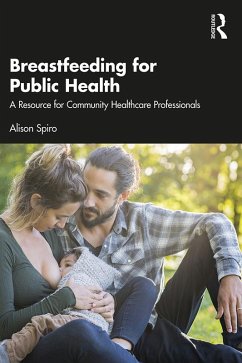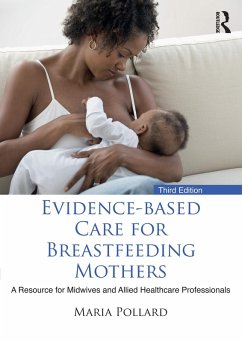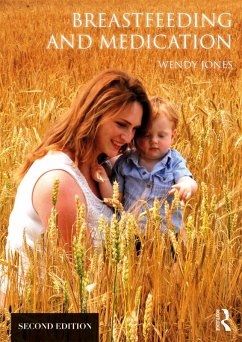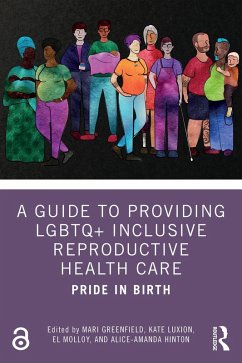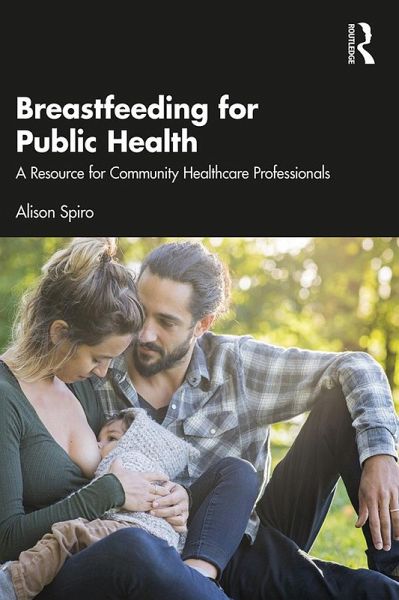
Breastfeeding for Public Health (eBook, PDF)
A Resource for Community Healthcare Professionals
Versandkostenfrei!
Sofort per Download lieferbar
37,95 €
inkl. MwSt.
Weitere Ausgaben:

PAYBACK Punkte
19 °P sammeln!
Health visitors play a crucial role in supporting mothers who choose to breastfeed and their families. This accessible text enables readers to practise confidently in this vital area, focusing on underpinning knowledge and parent-centred counselling skills, and understanding cultural contexts.Breastfeeding a child improves the lifelong health of a population, and promoting breastfeeding is an important area of public health practice. Breastfeeding for Public Health incorporates the voices of health visitors, mothers and fathers to give insight into common practical challenges faced and suggest...
Health visitors play a crucial role in supporting mothers who choose to breastfeed and their families. This accessible text enables readers to practise confidently in this vital area, focusing on underpinning knowledge and parent-centred counselling skills, and understanding cultural contexts.
Breastfeeding a child improves the lifelong health of a population, and promoting breastfeeding is an important area of public health practice. Breastfeeding for Public Health incorporates the voices of health visitors, mothers and fathers to give insight into common practical challenges faced and suggestions for overcoming or working around them. Presenting up-to-date research, it explores the practical skills needed by health visitors to support mothers with breastfeeding; how to develop the communication skills and self-awareness necessary to build successful and trusting relationships with women and their families; why breastfeeding is so important for babies' and mothers' health and psychological attachment, closeness and long-term mental health; what we know about the content of breastmilk and the positive effect it has on the baby's gut microbiome, which in turn benefits the infant's long-term health and helps to protect against non-communicable diseases; the role of the father and grandparents in successfully initiating and sustaining breastfeeding; and how cultural awareness and sensitivity can influence practice for the better.
Written by an experienced volunteer and practitioner with decades of experience as a health visitor and breastfeeding counsellor, this text is ideal for students taking Specialist Community and Public Health Nursing courses. It is also an important reference for practising health visitors.
Breastfeeding a child improves the lifelong health of a population, and promoting breastfeeding is an important area of public health practice. Breastfeeding for Public Health incorporates the voices of health visitors, mothers and fathers to give insight into common practical challenges faced and suggestions for overcoming or working around them. Presenting up-to-date research, it explores the practical skills needed by health visitors to support mothers with breastfeeding; how to develop the communication skills and self-awareness necessary to build successful and trusting relationships with women and their families; why breastfeeding is so important for babies' and mothers' health and psychological attachment, closeness and long-term mental health; what we know about the content of breastmilk and the positive effect it has on the baby's gut microbiome, which in turn benefits the infant's long-term health and helps to protect against non-communicable diseases; the role of the father and grandparents in successfully initiating and sustaining breastfeeding; and how cultural awareness and sensitivity can influence practice for the better.
Written by an experienced volunteer and practitioner with decades of experience as a health visitor and breastfeeding counsellor, this text is ideal for students taking Specialist Community and Public Health Nursing courses. It is also an important reference for practising health visitors.
Dieser Download kann aus rechtlichen Gründen nur mit Rechnungsadresse in A, B, BG, CY, CZ, D, DK, EW, E, FIN, F, GR, HR, H, IRL, I, LT, L, LR, M, NL, PL, P, R, S, SLO, SK ausgeliefert werden.




